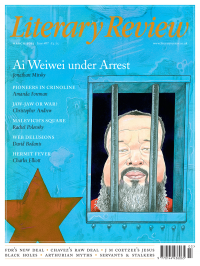Maya Jaggi
Au Revoir, Franglais
On my way to Montreal last November, I chanced on a short film in which a father grows distraught when his baby son’s first utterance is not ‘papa’ but ‘daddy’. In First Words (2011), the competition between a bilingual couple – one francophone, one Anglo – to give pride of place in the nursery to their own mother tongue mirrors Quebec’s perennial tussle over language. The husband’s predicament – at one point he itches to set fire to his child’s English picture books – was blurbed as a ‘French Canadian father’s worst nightmare’. Fabien Melanson’s eight-minute short, showcased on an Air Canada flight, gave a mischievous insight into francophone Quebecers’ deep-seated fear that their language and identity are under siege.
That sense of beleaguerment might seem misplaced amid the throngs at the Salon du Livre in the Place Bonaventure – a 1960s complex linked to a warren of downtown subterranean malls, known as the Underground City, which gives Montrealers sanctuary from sub-zero winters. The Salon, in Quebec’s cultural metropolis, is

Sign Up to our newsletter
Receive free articles, highlights from the archive, news, details of prizes, and much more.@Lit_Review
Follow Literary Review on Twitter
Twitter Feed
The son of a notorious con man, John le Carré turned deception into an art form. Does his archive unmask the author or merely prove how well he learned to disappear?
John Phipps explores.
John Phipps - Approach & Seduction
John Phipps: Approach & Seduction - John le Carré: Tradecraft; Tradecraft: Writers on John le Carré by Federico Varese (ed)
literaryreview.co.uk
Few writers have been so eagerly mythologised as Katherine Mansfield. The short, brilliant life, the doomed love affairs, the sickly genius have together blurred the woman behind the work.
Sophie Oliver looks to Mansfield's stories for answers.
Sophie Oliver - Restless Soul
Sophie Oliver: Restless Soul - Katherine Mansfield: A Hidden Life by Gerri Kimber
literaryreview.co.uk
Literary Review is seeking an editorial intern.